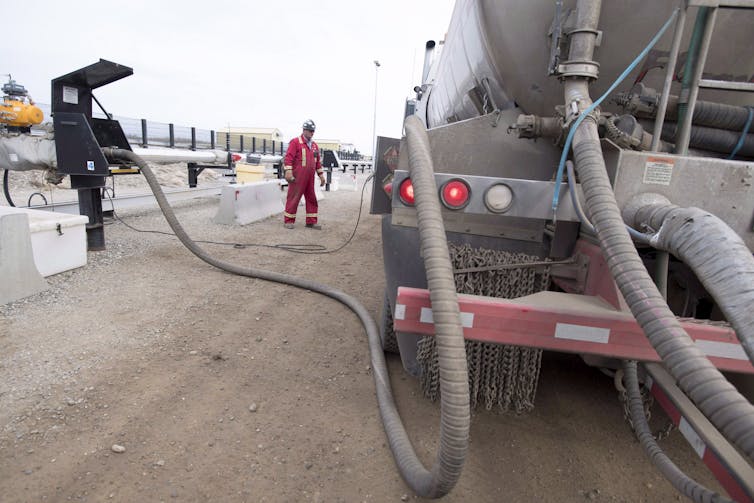At the ballot box, cast a vote for climate change innovation and investment


Climate change will be top of mind for many Canadians as they cast their ballots in this federal election — and for good reason.
Canada is already experiencing the costly effects of climate change from floods, forest fires, heat waves and increasingly intense weather events. The country is warming at twice the global rate, and three times faster in the Arctic.
As interdisciplinary climate scholars working on Canada’s transition to a zero-carbon society, we suggest Canadians consider which party is most capable of advancing the following three climate policy priorities following the election.
Understanding costs
There’s a cost to climate action, and Canadians understandably voice concerns when hearing about carbon taxes and additional mitigation strategies. But the costs, and the pain, of climate change only increase the longer we wait to act.
There are three key cost components to climate policy.
1. Maintaining carbon pricing
We can’t afford to scrap the federal carbon price. It’s as necessary as taking an antibiotic when facing a strong microbial infection.
In fact, the carbon price must rise over time — and fast. Pricing carbon emissions below the cost of their damage to society — the “social cost of carbon” — subsidizes air pollution and climate change.
Read more:
Here’s what the carbon tax means for you
The International Renewable Energy Agency estimates that doubling the share of renewable energy would save Canadians about $15 billion in the social costs — what economists call negative externalities — associated with fossil fuels, due mostly to health issues related to pollution.
2. Eliminating fossil fuel subsidies
The Organization for Economic Co-operation and Development (OECD) suggests that fossil fuel subsidies have declined in Canada since 2013. But the OECD’s estimate omits negative externalities, including the costs of climate change, air pollution and traffic accidents. It also ignores Canada’s increasing subsidies to the liquefied natural gas (LNG) industry.

THE CANADIAN PRESS/Jonathan Hayward
By contrast, the International Monetary Fund includes the social cost of carbon in its measurement of fossil fuel subsidies. It estimates that Canada provided approximately $57 billion (US$43 billion) in post-tax subsidies to the fossil fuel industry in 2015 alone.
Read more:
Fossil fuel subsidies reach US$87 billion in EU countries – and they’re growing
No matter how they’re measured, fossil fuel subsidies are perverse public investments in pollution and climate change. They must be eliminated.
3. Investing in a zero-carbon transition
According to Natural Resources Canada, the federal and provincial investments in energy research, development and deployment (RD&D) totalled $2.26 billion for the fossil fuel industry, including carbon capture and storage, between 2011 and 2015. That was nearly double their investments in RD&D for renewable energy, at $1.39 billion.
These levels of public investment create an unequal competitive playing field and stifle green innovation. As important as public investment is to nurture innovation in energy systems, the federal government’s responsibility to provide forward-looking strategic direction is equally important.
A just transition
Canadians should prioritize a just transition to a zero-carbon society.
Climate change already has and will continue to create winners and losers. While ambitious actions to mitigate climate change are urgently needed, they shouldn’t come at the expense of the most affected or vulnerable communities.
Climate policy should address the threats to those living in the North, including Indigenous communities, whose very way of life is threatened by climate change. It must also support rural Canadians, who don’t benefit from government investments in public transportation available to urbanites.
Retraining and transitioning workers from carbon-intensive industries to a green economy is another critically important but under-emphasized initiative.
Overall, a just transition to a zero-carbon society must not exacerbate existing disadvantages or create new inequalities.
Climate policy co-benefits
A zero-carbon energy transition is facilitated by options that reduce fossil fuel consumption while offering citizens “co-benefits” in terms of comfort, lifestyle and health.
Community-developed adaptation plans should create locally relevant ways to reduce emissions and improve quality of life. Investing in the restoration of urban forests, for instance, removes carbon dioxide from the atmosphere and reduces the urban “heat island” effect and air conditioning bills.
Retrofitting homes and workplaces reduces emissions and Canadians’ energy costs while creating new jobs and increasing comfort. Making cities more walkable reduces emissions from transportation and makes them safer for women and healthier for all.
These are key climate policies that Canada urgently needs to pursue. As Canadians prepare to cast their ballots they need to realize that two federal parties — the Conservative Party and the People’s Party of Canada — have explicitly pledged to undo the existing climate policy framework and scrap national carbon pricing.
Four of the parties address climate change in their platforms, yet their proposed policies are not linked to estimated emissions reductions, which is the only way to assess whether a party’s suite of policies is capable of leading to sufficient decarbonization.
In making their choice on election day, Canadians should vote for the party most likely to invest in innovative and inclusive climate policies in the days after the polls close.
Members of the Sustainable Canada Dialogues research network also contributed to this article.
[ Like what you’ve read? Want more? Sign up for The Conversation’s daily newsletter. ]
![]()
Jason MacLean is a member of the Board of the Pacific Centre for Environmental Law and Litigation (CELL).
Catherine Potvin receives funding from the Natural Sciences and Engineering Research Council of Canada and the Canada Research Chairs Program.
